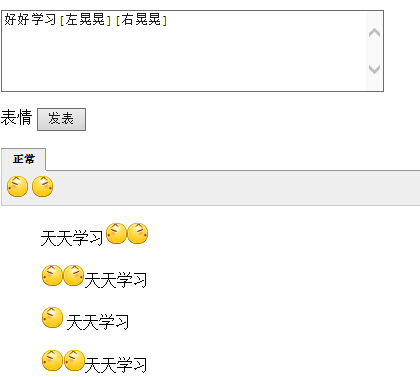效果:
点表情图,在表单中表示为[左晃晃]。
见过一个使用jquery来模拟新浪微博的表情插入。
使用Python2.7和Django1.6来实现。
看书好长时间,但是自己来写,发现真的没记住。
方法描述:
1、浏览器页面,使用js脚本把表情符号添加到Textarea;
2、Views里面使用正则把记录里的[]内容替换为图片,渲染到浏览器。
使用一个简单的Sqlite3数据表。
settings.py里设置sqlite3很简单,默认就好。
由于编码问题,项目使用英文路径,创建数据库不会出现问题。
models.py
class emotion(models.Model):
text=models.CharField(max_length=100)默认一个ID自动增长字段。
views.py
#coding:utf-8
#使用python 2.7.6 django 1.6实现
import re
from django.shortcuts import render,render_to_response
from myemotion.models import emotion
#define emotion picture
emotion_category=[u'正常']
emotion_pictures={u'[左晃晃]':u'images/zhh_thumb.gif',u'[右晃晃]':u'images/yhh_thumb.gif'}
#display form
def emotion_form(request):
'''显示表情表单'''
emotion_1 = emotion()
#从表单取数据,存入数据表emotion
if request.method == 'POST':
emotion_1.text = request.POST.get('text','')
emotion_1.save()
#取所有记录
query = emotion.objects.all()
return render_to_response('emotion.html',{'emotion_category':emotion_category,'emotion_pictures':emotion_pictures, 'query':query})只实现记录的保存,并渲染记录。
csrf这个直接注释掉了,没使用。
网页部分只列js代码,就2句:
{% for alt,url in emotion_pictures.items %}
<span style="white-space:pre"> </span><img src="{% static url %}" οnclick="addText(event,id);" id="{{alt}}" >
{% endfor %}<!--增加表情到文本域 -->
function addText(event,id) {
document.getElementById("textarea").value += id;
}static指令失效,也是由于编码问题,要修改python的site.py把编码直接改到gbk。
这里使用了js的event事件。
显示记录,使用过滤器来把[]转换为图片。
{% for q in query %}
<span style="white-space:pre"> </span><ul>
<span style="white-space:pre"> </span><!-- 使用过滤器 -->
<span style="white-space:pre"> </span>{{ q.text|emotion_replace|safe }}
<span style="white-space:pre"> </span></ul>
{% endfor %}使用safe,避免html标签被自动转义。 emotion_replace 是自定义过滤器。
<pre name="code" class="python">#coding:utf-8
import re
from django import template
from form1 import settings
#定义过滤器,替换文字为图像
#中文范围 : [\u4e00-\u9fa5]
register=template.Library()
#使用全局变量
emotion_pictures={u'[左晃晃]':'images/zhh_thumb.gif',u'[右晃晃]':'images/yhh_thumb.gif'}
#@register.filter
def emotion_replace(value):
pattern = re.compile(ur'(\[[\u4e00-\u9fa5]+\])')
#使用findall取得所有匹配结果
match = re.findall(pattern,value)
if match is not None:
#循环结果列表
for g in match:
#[左晃晃]如果在字典中存在
if emotion_pictures.get(g, '') != '':
pic = '<img src = \''+ settings.STATIC_URL + emotion_pictures[g] + '\'></img>'
#使用replace方法替换
value = value.replace(g, pic)
return value
register.filter(emotion_replace)
过滤器在一个文件中定义,放到文件夹中,和templates同级,叫templatetags。 emotion_replace.py
<pre name="code" class="python">#coding:utf-8
import re
from django import template
from form1 import settings
#定义过滤器,替换文字为图像
#中文范围 : [\u4e00-\u9fa5]
register=template.Library()
#使用全局变量
emotion_pictures={u'[左晃晃]':'images/zhh_thumb.gif',u'[右晃晃]':'images/yhh_thumb.gif'}
#@register.filter
def emotion_replace(value):
pattern = re.compile(ur'(\[[\u4e00-\u9fa5]+\])')
#使用findall取得所有匹配结果
match = re.findall(pattern,value)
if match is not None:
#循环结果列表
for g in match:
#[左晃晃]如果在字典中存在
if emotion_pictures.get(g, '') != '':
pic = '<img src = \''+ settings.STATIC_URL + emotion_pictures[g] + '\'></img>'
#使用replace方法替换
value = value.replace(g, pic)
return value
register.filter(emotion_replace)
最重要的是pattern = re.compile(ur'(\[[\u4e00-\u9fa5]+\])')这句。匹配[左晃晃]。
\[ \] 表示转义,匹配[]
[\u4e00-\u9fa5]匹配任意Unicode字符
+匹配多个字符,要避免贪婪,可以加一个?()
把[..]匹配的返回为一个group使用findall方法,返回一个列表,不使用groups方法。使用replace方法,而不是用re去替换,简化了问题。
Python 2.7的编码问题真麻烦。
ur的顺序不能颠倒,表示unicode和raw字符串。
看起来,比jquery的实现,代码要少很多。这里也没做autotest。程序很简单,好不容易写出表情替换和显示。


























 267
267

 被折叠的 条评论
为什么被折叠?
被折叠的 条评论
为什么被折叠?










